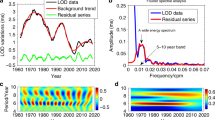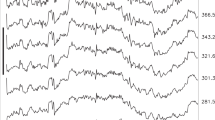Abstract
DURING the past decade, the analysis of long term changes in inclination of Earth-orbiting satellites has been used to determine characteristics of the zonal wind field in the Earth's upper atmosphere. As reviewed by King-Hele1, results of analyses of this type indicate that, on average, the atmosphere between 200 and 350 km rotates faster than the Earth. Average eastward wind speeds of the order of 100 m s−1 with respect to the Earth's surface are indicated in the altitude region around 300 km.
This is a preview of subscription content, access via your institution
Access options
Subscribe to this journal
Receive 51 print issues and online access
$199.00 per year
only $3.90 per issue
Buy this article
- Purchase on Springer Link
- Instant access to full article PDF
Prices may be subject to local taxes which are calculated during checkout
Similar content being viewed by others
References
King-Hele, D. G., Space Res. XII, 847–855 (1972).
King-Hele, D. G., Proc. R. Soc., A 330, 467–494 (1972).
King-Hele, D. G., Proc. R. Soc., A 294, 261–272 (1966).
Evans, J. V., J. atmos. terr. Phys., 34, 175–209 (1972).
Creekmore, S. P., Straus, J. M., Harris, R. M., Ching, B. K., and Chiu, Y. T., J. atmos. terr. Phys. (in the press).
Author information
Authors and Affiliations
Rights and permissions
About this article
Cite this article
STRAUS, J., CHING, B. Effects of meridional winds on the interpretation of satellite inclination data. Nature 252, 672–674 (1974). https://doi.org/10.1038/252672b0
Received:
Issue Date:
DOI: https://doi.org/10.1038/252672b0
Comments
By submitting a comment you agree to abide by our Terms and Community Guidelines. If you find something abusive or that does not comply with our terms or guidelines please flag it as inappropriate.



